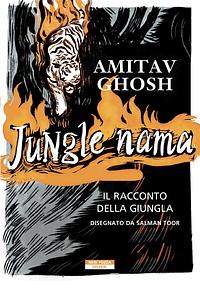You need to sign in or sign up before continuing.
Take a photo of a barcode or cover
adventurous
informative
reflective
fast-paced
Plot or Character Driven:
Character
Strong character development:
Complicated
Loveable characters:
Complicated
Diverse cast of characters:
Yes
Flaws of characters a main focus:
N/A
adventurous
dark
emotional
hopeful
inspiring
reflective
fast-paced
Plot or Character Driven:
Plot
Strong character development:
No
Loveable characters:
Yes
Diverse cast of characters:
No
Flaws of characters a main focus:
Yes
Amitav Ghosh never disappoints. This made me realize that the only form of poetry I like is one that rhymes. And the poyar meter was a very fun. Was not expected a lot from this, but it was great.
Jungle Nama: A Story of the Sunderban by Amitav Ghosh, illustrated by Salmon Toor
This is a lovely companion to Bon Bibi's folktale highlighted in the Hungry tide.
Initially, as I read the book with its rhyming words and its short prose, it comes off as a children's book. When we are young, we often read fairytales and folktales with a moral ending or a message.
Similar to them, Jungle nama is not just for children, but akin to all age groups but delivers an important message.
This message is of course prone to multiple perceptions of greed of humans in this case- Dhona who wants to exploit the forest's wealth for himself.
Or Dokkhin Rai, in the form of the majestic striped tiger seducing our innermost devils and taking us in the wrong path.
The language is simple to understand but the message is clear, contentment is the star of the novel. Bon Bibi, a mighty goddess hears the people who use the correct meter and pray for her.
She is ever powerful and she will come to your aid. To this day, the residents of the Sunderbans perform this play and also pray at the temple, open for people of all castes for protection in he forests against the man eating tiger.
The Sundebans, an archipealgo of islands is rich in mangroves , wildlife diversity and culture. Dokkhin Rai lies in wait to the marauders who exploit he islands' wealth. There are branches to other important issues as well- the most problematic being climate change and the flash floods faced by the residents frequently.
This is a lovely companion to Bon Bibi's folktale highlighted in the Hungry tide.
Initially, as I read the book with its rhyming words and its short prose, it comes off as a children's book. When we are young, we often read fairytales and folktales with a moral ending or a message.
Similar to them, Jungle nama is not just for children, but akin to all age groups but delivers an important message.
This message is of course prone to multiple perceptions of greed of humans in this case- Dhona who wants to exploit the forest's wealth for himself.
Or Dokkhin Rai, in the form of the majestic striped tiger seducing our innermost devils and taking us in the wrong path.
The language is simple to understand but the message is clear, contentment is the star of the novel. Bon Bibi, a mighty goddess hears the people who use the correct meter and pray for her.
She is ever powerful and she will come to your aid. To this day, the residents of the Sunderbans perform this play and also pray at the temple, open for people of all castes for protection in he forests against the man eating tiger.
The Sundebans, an archipealgo of islands is rich in mangroves , wildlife diversity and culture. Dokkhin Rai lies in wait to the marauders who exploit he islands' wealth. There are branches to other important issues as well- the most problematic being climate change and the flash floods faced by the residents frequently.
beautiful, simple, effective, with incredible illustrations and page accents to tie it all together neatly
Set deep within the Sundarbans, “Jungle Nama” is a retelling of the traditional Bengali folk story of Bon Bibi. This particular adaptation actually focuses on an episode where a group of men decided to delve deep into the forests in pursuit of riches. It is an allegory of how greed transforms mankind into agents of destruction to nature and reminder for us to seek balance as we only have one earth to live in. Typically tales like these are told for children. But with the current climate crisis that we are facing, it transforms from a folktale to a very real and very relevant story.
.
Another thing worth noting is how the books is written. The original version of the legend from 19th century is composed in a Bengali verse meter known as dwipodi-poyar. In this adaptation, Ghosh emulates this style by writing the story entirely in poyar-like meter of 24 syllable couplets. It is also beautifully illustrated by Salman Toor. I got my copy from a friend as this book is not for sale to Indonesia. So so grateful to have this!
.
Another thing worth noting is how the books is written. The original version of the legend from 19th century is composed in a Bengali verse meter known as dwipodi-poyar. In this adaptation, Ghosh emulates this style by writing the story entirely in poyar-like meter of 24 syllable couplets. It is also beautifully illustrated by Salman Toor. I got my copy from a friend as this book is not for sale to Indonesia. So so grateful to have this!
adventurous
medium-paced
adventurous
dark
hopeful
inspiring
mysterious
reflective
fast-paced
Plot or Character Driven:
Character
Strong character development:
Yes
Loveable characters:
Complicated
Diverse cast of characters:
Yes
Flaws of characters a main focus:
Yes
adventurous
medium-paced
adventurous
emotional
informative
reflective
fast-paced
Plot or Character Driven:
Plot
Strong character development:
Yes
Loveable characters:
Yes
Diverse cast of characters:
No
Flaws of characters a main focus:
Yes
"All you need to do, is he content with what you've got;
to be always craving more, is a demon's lot."
Masterful book, both the words and the images.
to be always craving more, is a demon's lot."
Masterful book, both the words and the images.




